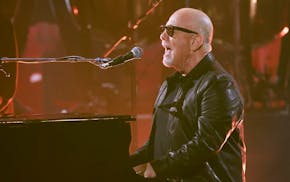Aaron Sorkin, the most celebrated TV writer of the past 30 years, was getting pummeled.
The assault occurred last summer in a Los Angeles ballroom, where he faced a hostile gang of television critics who appeared ready to hurl their finger-food sandwiches at their former savior.
Sorkin was defending "The Newsroom," his series that kicked off with dispassionate news anchor Will McAvoy suddenly becoming re-energized during a panel discussion when he spots his former producer/lover in the crowd with a sign that simply reads: "We Can Do Better."
As soon as the journalists at the press conference finished their visceral dissection of the show, a clearly shaken Sorkin stood up and prepared to leave the stage when a rascally critic sitting next to me held up a piece of paper for Sorkin to see. The words: "We Can Do Better."
Sorkin nudged Jeff Daniels, who plays McAvoy, pointed out the inside joke, and chuckled.
As much as I admire my buddy's chutzpah, I don't agree with the sentiment of many of my peers reflected through the sign.
Could "The Newsroom" be better? Sure, but for all its faults, it won a spot in my top 10 list last season and, based on early episodes from Season 2, which starts this Sunday, it remains compelling, whip-smart TV.
But I don't want to totally disregard my respected peers' views. Here are some of their most pointed comments from reviews, and my humble counterpoints:
Sorkin is all talk.
"Sorkin is often presented as one of the auteurs of modern television, an innovator and an original voice. But he's more logically placed in a school of showrunners who favor patterspeak, point-counterpoint and dialogue-driven tributes to the era of screwball romance. Some of this banter is intelligent; just as often, however, it's artificial intelligence, predicated on the notion that more words equals smarter." — Emily Nussbaum, the New Yorker
Sorkin's chatter may seem "artificial" to a sophisticated New Yorker writer, but for a simpleton like me, it gets the brain juices flowing. Should the folks behind Occupy Wall Street be praised or panned for operating without leadership? Should political reporters just accept talking points on the campaign trail or challenge them and risk being left out of the loop? Should you accept the jurors' verdict in a capital-punishment case even if deep down in your heart you think they're wrong? Who does a better version of "Always on My Mind": Willie Nelson or Elvis Presley?
These are the head-scratchers laid out in Season 2, and although Sorkin does get long-winded at times, I'm willing to ride it out until he gets to the point.
Sorkin hates women.
"Either Sorkin is no longer able to write credible women characters, or he no longer wants to. The show's strongest woman is Emily Mortimer's MacKenzie, Will's producer, but for every scene with her as Will's peer, there's another of her as a ninny — fumbling through a presentation, screwing up her e-mail, or abjectly apologizing to Will for a problem in their past relationship. In Sorkinworld, the men are men and the women are sorry." — James Poniewozik, Time
Truth is, just about all the characters slip into "ninny land." In upcoming episodes, executive producer Don Keefer falls out of a chair (twice), field reporter Jim Harper fumbles his way through his first days on the Mitt Romney campaign and McAvoy continues to make inappropriate comments that lead to drinks being thrown in his face.
I count plenty of competent female characters in the cast, including Olivia Munn's Sloan Sabbith, who is consistently referred to as the smartest person in the room, and Jane Fonda's Leona Lansing, who runs the entire network with bawdy fierceness. In this season, Alison Pill's Maggie Jordan fights to travel to Africa, not exactly a mission a weak woman would seek.
As Poniewozik points out in another part of his column, Sorkin created great female characters for "The West Wing" and "Sports Night." In my opinion, he's doing the same on "The Newsroom."
Sorkin is preachy.
" 'The Newsroom' displays all the subtlety of a jackhammer set to maximum or a terrier on speed. Characters talk at each other, they constantly preach to their colleagues and McAvoy frequently fulminates at his viewers at length. These soliloquies, even allowing for the familiar tics and tricks of Sorkinese, become deadening over time." — Maureen Ryan, Huffington Post
Ryan is dead-on when she points out that McAvoy's on-air commentaries are unrealistic and more pointed than we'd ever see in real life. But Sorkin's never been terribly interested in real life. If you think the White House seen in "The West Wing" was a true representative of modern-day politics, I've got a statue in New York Harbor I'd like to sell you. Sorkin has always been a pie-in-the-sky romantic, in the same vein as Frank Capra, Norman Rockwell and George M. Cohan. You want authenticity, tune to C-Span. This is Sorkin, whether you like it or not — and I like it.
Neal Justin • 612-673-7431

TV review: 'Jane' is the best heroine for families prepping for Earth Day

CBS will turn the lights back on for Billy Joel concert

TV to watch: Billy Joel offers concert for those of us who aren't big shots

Justin: 10 TV shows about the Founding Fathers that are more fun than Apple's 'Franklin'

